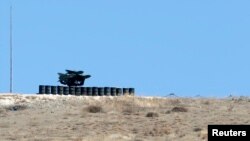ISTANBUL —
Turkey's army has deployed anti-aircraft missile batteries along the country's southern border with Syria and the Turkish government has held crisis meetings to discuss the potential fallout from a possible U.S. attack on Syria. Despite international efforts to stop a strike, Turkey is on edge.
Turkish Prime Minister Recep Tayyip Erdogan chaired a meeting of key ministers Tuesday to discuss the possible repercussions of a U.S. attack on Syria.
Ankara has been at the forefront of those governments demanding a strong military response against Damascus for its alleged chemical weapon attack last month.
International relations expert Cengiz Aktar of Istanbul’s Bahcesehir University said Turkey's stance makes it vulnerable to Syrian retaliation if Washington struck militarily.
"It’s probably the country which pushes most for all out war against Syria. Observers point out at the risk of retaliation. Syrian army may retaliate by bombarding Turkey; this is the definitely is one of the options in the cards. This may have dire consequences for Turkey, for the region, for Syria," said Aktar.
Last week, a senior Syrian diplomat warned its neighbors, including Turkey, that they may face retaliation if they supported a U.S. strike.
The Turkish army has been sending tanks and soldiers to bolster its forces along the more-than-900-kilometer border with Syria. In addition, a short-range missile base has been built and anti-chemical weapons units have been deployed close to the Syrian frontier.
Still, retired Turkish infantry brigadier Haldun Solmazturk said Turkey remained vulnerable to a Syrian retaliation.
"Syria is no match for Turkey, but it still, in terms of retaliation, it does have the capability to cause some harm and damage to Turkey, by using its artillery, by using its missiles and even by using its chemical weapons -- no doubt about this," he said. "If a chemical attack really occurs, I cannot say the Turkish army is really prepared for chemical warfare. So there is a real risk if any chemical agent is involved in a potential conflict between Turkey and Syria."
Despite Ankara's support for the U.S. strike, polls showed most Turks did not agree.
"We are against all kinds of war, not only Syria, before that Iraq, other countries with petrol oil, the big picture is that. Our politicians made a mistake -- they support America [going] to Syria," said a man in Istanbul.
So far, said Soli Ozel, a political columnist for the Turkish newspaper Haber Turk, Ankara has faced no political backlash for its pro-attack stance. But he said that could quickly change if Turkey were the target of Syrian retaliation.
"Much of Turkey’s politics is determined by what goes on domestically, but the Syrian conflict has really exacerbated some tensions within the country as well. Should there be attacks against Turkey and loss of life, then the mood might change drastically," said the columnist.
Officially, Ankara has not commented on its defense posture vis-a-vis Syria. Neither the Turkish military, which rarely speaks to the media, nor the Ministry of Defense have commented publicly on the additional measures.
Turkish Prime Minister Recep Tayyip Erdogan chaired a meeting of key ministers Tuesday to discuss the possible repercussions of a U.S. attack on Syria.
Ankara has been at the forefront of those governments demanding a strong military response against Damascus for its alleged chemical weapon attack last month.
International relations expert Cengiz Aktar of Istanbul’s Bahcesehir University said Turkey's stance makes it vulnerable to Syrian retaliation if Washington struck militarily.
"It’s probably the country which pushes most for all out war against Syria. Observers point out at the risk of retaliation. Syrian army may retaliate by bombarding Turkey; this is the definitely is one of the options in the cards. This may have dire consequences for Turkey, for the region, for Syria," said Aktar.
Last week, a senior Syrian diplomat warned its neighbors, including Turkey, that they may face retaliation if they supported a U.S. strike.
The Turkish army has been sending tanks and soldiers to bolster its forces along the more-than-900-kilometer border with Syria. In addition, a short-range missile base has been built and anti-chemical weapons units have been deployed close to the Syrian frontier.
Still, retired Turkish infantry brigadier Haldun Solmazturk said Turkey remained vulnerable to a Syrian retaliation.
"Syria is no match for Turkey, but it still, in terms of retaliation, it does have the capability to cause some harm and damage to Turkey, by using its artillery, by using its missiles and even by using its chemical weapons -- no doubt about this," he said. "If a chemical attack really occurs, I cannot say the Turkish army is really prepared for chemical warfare. So there is a real risk if any chemical agent is involved in a potential conflict between Turkey and Syria."
Despite Ankara's support for the U.S. strike, polls showed most Turks did not agree.
"We are against all kinds of war, not only Syria, before that Iraq, other countries with petrol oil, the big picture is that. Our politicians made a mistake -- they support America [going] to Syria," said a man in Istanbul.
So far, said Soli Ozel, a political columnist for the Turkish newspaper Haber Turk, Ankara has faced no political backlash for its pro-attack stance. But he said that could quickly change if Turkey were the target of Syrian retaliation.
"Much of Turkey’s politics is determined by what goes on domestically, but the Syrian conflict has really exacerbated some tensions within the country as well. Should there be attacks against Turkey and loss of life, then the mood might change drastically," said the columnist.
Officially, Ankara has not commented on its defense posture vis-a-vis Syria. Neither the Turkish military, which rarely speaks to the media, nor the Ministry of Defense have commented publicly on the additional measures.










